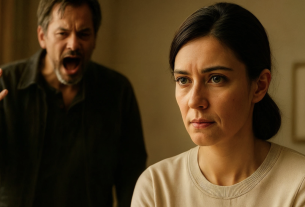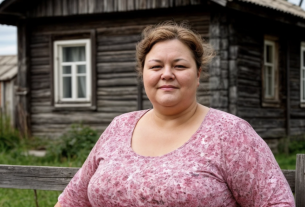— “…so tomorrow we’re going to buy the tickets! Can you imagine, Mom? Finally! Direct flights, all the way to the ocean,” Vika’s voice rang with unfeigned happiness. She set a box of pastries from her mother’s favorite confectionery on the table—a small ritual offering meant to soften the news and share the joy. Andrei, her husband, sat beside her, smiling silently. He had his arm around her shoulders, and in that simple gesture lay the story of their last three years: endless work, saving on everything, giving up little pleasures for the sake of one big dream. And now it was almost tangible.
Her mother, Valentina Petrovna, who had been smiling reservedly until that moment, froze with her cup in hand. The smile didn’t just vanish—it was as if someone had erased it with a rubber, leaving behind a hard, impenetrable mask. She slowly set the cup onto the saucer, and the dry clink of porcelain sounded jarringly loud in the cozy kitchen.
“What vacation?” Her voice held no warmth at all; it had gone flat and metallic. “Have you both lost your minds?”
Vika and Andrei exchanged glances. The festive anticipation began to evaporate, giving way to the familiar, viscous tension that always arose whenever the conversation turned to money or to plans that didn’t fit into Valentina Petrovna’s picture of the world.
“Mom, we told you. We’ve been saving for three years. We earned this,” Vika began cautiously, still hoping this was just a brief lapse.
“Earned?” Valentina Petrovna slowly rose from the table, bracing herself on it with her knuckles. She was short, but in that moment it felt like she filled the entire kitchen. “Your sister, Lera, is suffocating in a pit of debt! She has loans, interest is piling up every day! She can’t sleep at night, wondering how to get out of it, and you’re telling me about the ocean? Do you even have a conscience, Vika? She’s your blood! And you plan to throw money at sand and palm trees when your sister is on the edge of a cliff?”
The accusations flew like stones. Every word was calibrated to hurt more. Valentina Petrovna didn’t raise her voice. She spoke with pressure, with the force of a press, turning the air into a thick, suffocating mass. Andrei tensed; his hand on Vika’s shoulder grew firmer, becoming a brace instead of a tender gesture. He knew his role now—to be the rock against which the waves would break.
Vika kept silent, letting her mother get it out. She didn’t interrupt, didn’t justify herself. She just looked at her, and there was neither hurt nor guilt in her gaze. There was a cool, analytical interest, like a scientist observing a predictable chemical reaction. When the flow of words ran dry and Valentina Petrovna exhaled heavily, expecting tears, repentance, or at least an argument, Vika did what no one expected.
Calmly, without the slightest fuss, she bent down, opened her handbag, and took out a small hard-covered notebook and an expensive fountain pen. The click of the cap sounded like a gunshot in the sudden silence. She opened to a blank page.
“All right, Mom. I understand,” her voice was absolutely even, devoid of emotion. “You’re proposing that Andrei and I act as investors in Lera’s financial recovery project. That’s a serious proposal, and we should approach it responsibly.”
Valentina Petrovna was taken aback, her mouth falling open in astonishment. She had been ready for a scandal, for tears, for anything—but not for this icy, businesslike tone.
“For us to consider your application,” Vika continued, moving the pen over the paper as if making notes, “please provide the following documents. First: a complete statement of all Lera’s loans with exact amounts, interest rates, and the names of the creditors. Second: a detailed report of her income and expenses for the last calendar year. And third: a business plan to exit the crisis, signed personally by Lera. We need to see exactly how and within what time frame she intends to repay us.”
She raised her eyes to her mother.
“We don’t do charity for the financially illiterate. As soon as the full document package is ready, we’ll review it within three business days and give you our answer. For now, excuse us—we have to go. Tickets won’t buy themselves.”
Glossy tickets smelling of fresh ink lay on the kitchen table—two rectangles of thick card, symbols of victory over routine. Vika and Andrei sat across from each other, drinking their morning coffee in silence. Words weren’t necessary. After yesterday’s visit to her mother, they moved as a single, well-oiled mechanism. They had stopped by a travel agency, chosen a hotel without needless debate, paid, and now looked at the tangible embodiment of their goal. It was their shared achievement, hard-won, and all the more precious for it.
A persistent, demanding buzz from the intercom ripped through the morning idyll. Andrei looked at Vika with a question in his eyes. They weren’t expecting anyone. Vika went to the receiver.
“Yes?”
“It’s me, open up,” came Lera’s voice, purposely pitiful and broken.
Vika pressed the button without changing expression. She returned to the table just as the doorbell rang. Andrei went to open it. A minute later, Lera walked into the kitchen. She looked like an actress playing a martyr in a low-budget production: slightly puffy eyes, a sorrowful set to her lips, slumped shoulders. Yet her manicure was fresh, and her hair smelled of an expensive salon treatment. She stopped on the threshold; her gaze fell on the tickets, and her face twisted as if she’d seen a snake.
“I didn’t believe Mom. I thought she was exaggerating,” Lera said, her voice full of tragedy. “But you really did it. You bought them.”
“Did what, Lera? Bought tickets for a vacation we paid for ourselves?” Vika took a sip of coffee; her tone was calm, almost indifferent. She didn’t offer her sister a seat or a drink. She simply waited.
Lera walked into the kitchen and dropped onto a chair, letting her hands fall theatrically onto her knees. She was clearly counting on sympathy, on an emotional reaction, but ran into a wall of polite indifference. Andrei stood up silently and deliberately washed his cup, making it clear he was a mere bystander to the performance—but a bystander entirely and unequivocally on his wife’s side.
“Do you have any idea what it’s like for me?” Lera launched into the main act of her mission. “I sleep three hours a night. My phone is blowing up with calls from collectors. I’m afraid to go outside. I thought you were my sister, my support. I thought we were family. And you… you buy tickets to the sea. How can you be happy knowing I’m in this state?”
She spoke carefully, choosing words to jab deeper, to trigger guilt. She appealed to childhood, to shared memories, to blood ties—to everything that usually worked without fail. But Vika remained impenetrable.
“Where are the documents?” she asked when Lera paused to catch her breath.
Lera froze, not immediately understanding the question.
“What? What documents?”
“The ones I asked Mom for. Account statements, an income-and-expense report, a business plan. You came to discuss an investment in your financial stability, right? I’m waiting for the document package for analysis. Without it, the conversation is pointless.”
It was a blow below the belt. Lera had expected anything: shouting, reproaches, tears, arguments. But this cold, detached businesslike manner knocked the ground out from under her. She had come to manipulate feelings and was met like a door-to-door salesman with a dubious product.
“You’re mocking me?” her voice lost the pleading notes and filled with venom. “What business plan? I’m your sister, not a startup! I have problems and you act like a callous, soulless doll! Is it him who made you like this?” She shot a hateful look toward Andrei, who was just then setting his perfectly washed cup to dry.
“It’s my money, Lera. And my husband’s,” Vika carefully slid her cup aside, each movement precise and measured. “We’re not going to pay for your mistakes out of our pocket just because we share parents. You’re an adult. You made decisions when you took those loans. Now make a decision about how to repay them. If you want our help—prove you deserve it. Provide the documents.”
Lera realized she had lost. The performance had flopped. She stood abruptly, knocking the chair over.
“You’ll regret this, Vika,” she hissed. “I’ll make sure you regret it. Mom won’t leave it like this.”
She left the kitchen without bothering to pick up the chair. Andrei silently set it upright. Vika picked up one of the tickets, ran her finger over the glossy surface, over the lines with their names and the destination. Her resolve had just become even firmer.
Her mother called two days later. The voice in the receiver was soaked in fake, syrupy cordiality that Vika had learned to recognize since childhood. It was always a harbinger of some large-scale manipulation.
“Vikulia, sweetheart, hi. Listen, Aunt Galya and Uncle Misha are coming on Saturday—we haven’t seen them in ages. I want to set a table, have a little family get-together. You’ll come with Andrei, won’t you? They’ve missed you so much.”
Vika covered the receiver with her hand and looked at Andrei, who had just walked into the room. She silently mouthed, “Aunt Galya.” Andrei understood at once and gave the slightest nod. He knew it was a trap. Vika knew it was a trap. But backing out now would mean showing weakness, giving them a reason to call it cowardice.
“Yes, Mom, of course. What time should we be there?” she answered in a steady, calm voice.
On Saturday they entered her mother’s apartment as if stepping onto enemy territory. The air was thick with the smell of roast chicken—and of hypocrisy. Aunt Galya, a plump woman with a perpetually sympathetic expression, and her taciturn husband, Uncle Misha, were already seated at the laden table. Lera, with the look of a beaten dog, was pouring juice into glasses. Her entire appearance screamed of suffering and the world’s injustice.
The first hour passed in a sticky, slow conversation about health, prices, and neighbors. It was artillery preparation. Vika and Andrei answered in monosyllables, offering not the slightest hook into their lives, plans, or mood. They were polite, impenetrable, and alien at this feast of orchestrated grief.
The offensive began with Aunt Galya, as the director of this play—Valentina Petrovna—had intended.
“I look at you, kids, and I’m so happy,” Aunt Galya began, dabbing her lips with a napkin. “But my Sveta had a real misfortune. Her husband lost his job, couldn’t make the car payments. So my Vitka, her brother, didn’t say a word. He withdrew his savings and paid it all off. He said, ‘We’re family—who else will help her?’ Now that’s what I call kin!”
Valentina Petrovna picked it up at once, sighing theatrically:
“Golden words, Galya. Family is the most important thing. It’s when you give the shirt off your back to pull your own out of trouble. Not just thinking of yourself. Young people these days are different—selfish. Only their own pleasures on their mind.”
Her gaze was fixed directly on Vika. Uncle Misha grunted in agreement as he speared a piece of chicken. Lera lowered her eyes, her shoulders trembling in soundless sobs. The performance reached its climax.
“Yes, Mom, you’re right. Egoism is terrible,” Vika suddenly said loud and clear. All eyes turned to her. Unfazed, she took a napkin from the table and dabbed her lips, exactly mirroring Aunt Galya’s gesture, then reached into her handbag. “Especially when it disguises itself as misfortune.”
She pulled out a neat stack of papers and set it beside her plate. They were prints on good, heavy photo paper. Andrei moved his glass aside, giving her more space.
“While preparing for our investment negotiations, I’ve done a little research. A financial audit, so to speak,” Vika took the top sheet. On it was a bright photograph of Lera with friends at an expensive restaurant. “For example, this. The restaurant ‘Oblaka,’ average bill—five thousand rubles per person. Date—two weeks ago. The very day when, according to you, Lera, collectors were calling you.”
She set the first sheet aside and took another. It showed a screenshot from an online store page with the latest model phone.
“And this—a new smartphone purchase. Price—one hundred and twenty thousand rubles. Date—a month ago. Three days before the first loan went delinquent. An interesting investment during a financial crisis.”
Lera’s head snapped up; an ugly, dark flush flooded her face. Her mother froze with a fork in her hand. Aunt Galya and Uncle Misha stopped chewing.
“And here’s my favorite,” Vika picked up a third sheet with screenshots of business-class taxi orders. “Trips around the city exclusively in premium comfort. Because the bus, apparently, has too many reminders of a hard life.”
She neatly stacked the photos and looked at each person at the table in turn.
“Is this the ‘crisis’ for which Andrei and I are supposed to sacrifice our first vacation in three years? Is this the ‘abyss’ we should be hauling someone out of—someone who won’t even try to stop jumping into it?”
Dead silence fell over the table. The only sound was the ticking of the old hallway clock. Vika stood. Andrei rose with her.
“Thank you for dinner—it was very enlightening,” she said, looking straight into her mother’s eyes, now purple with rage and humiliation. “I think our evening is over.”
The day before departure was filled with quiet, focused bustle. Two half-packed suitcases stood on the living-room floor. Andrei methodically rolled T-shirts into neat cylinders; Vika sorted sunscreen tubes into cosmetic bags and arranged a first-aid kit. They barely spoke, trading only short phrases: “Did you pack the adapter?” “Check the forecast.” After the relatives’ dinner, they both understood—this was the calm before the final, decisive storm. And they were ready.
The attack began at exactly seven in the evening. First—a long, hysterical ring at the door. Then—a series of hard, thudding blows, as if someone were pounding on it with a fist. Andrei looked at Vika, and she only nodded. He went and opened the door.
On the threshold stood her mother and Lera. Their faces were contorted with naked fury. No trace of yesterday’s sorrow or false cordiality. Before them stood two Furies, driven to the edge by desperation and humiliation. They burst into the apartment without waiting for an invitation, and their eyes instantly locked onto the open suitcases—irrefutable proof of their defeat.
“So you’re going after all,” spat Valentina Petrovna, her voice shaking with anger. She swept the room with a wild gaze, as if searching for something to grab, something to destroy. “You decided you can just fly away and leave us here with our problems?”
Vika straightened slowly, closing the cosmetics case. She didn’t raise her voice or make any sudden moves. Her calm was her mother’s chief irritant.
“What problems could you possibly have, Mom? These are Lera’s problems,” she corrected mildly.
And then the dam burst. Valentina Petrovna stepped forward, her face flushed dark.
“What vacation?! What? Vika, your sister is mired in debt! So until you and your husband help her pay everything off, you’re not going anywhere! Period!”
This was no longer a reproach or a request. It was a command, an ultimatum delivered with the conviction of someone who believes she has every right.
“It’s all him!” Lera chimed in, jabbing a finger at Andrei. “He’s turned you against your own family! You’d never have become like this!”
Vika looked at her sister, then at her mother. She let them spew the first wave of venom, waited for them to pause and draw breath for a new tirade. And into that pause she struck.
“I was waiting for you to come,” her voice was quiet, but in the silence it cut like glass. “I thought after our dinner you’d understood everything. But apparently not. It’s not about restaurants and taxis, Mom. Those are trifles, dust thrown in the relatives’ eyes. It’s about sports betting.”
Lera’s face went paper-white. Valentina Petrovna froze, her mouth falling open.
“You’re lying…” Lera rasped.
“Lying?” Vika smiled without a hint of mirth. “Fifty thousand lost on a match two weeks ago. Another seventy at the beginning of the month. Should I go on? I found the person you owe the largest sum to. He was very talkative when he learned I didn’t plan to pay for you.”
Vika turned her gaze to her petrified mother.
“But even that isn’t the main thing. The main thing is the money. The very money you and Dad put aside for my down payment on an apartment. Two million. Where did it go, Mom? You told me you put it in a deposit at a good rate.”
Valentina Petrovna was silent, staring at her daughter in horror.
“You gave it to her,” Vika said—not a question, a statement. “You gave her my money so she could cover her betting debts. And she lost that too. And after that you came to me demanding money for a vacation? You came to demand that I pay for the fact that you stole my future and handed it to her to tear apart?”
The air grew so heavy it felt like it could be cut with a knife. All their family lies, omissions, and secrets spilled out, exposing the ugly truth of favoritism and betrayal.
“So here it is, Mom. There will be no help. No money. And we will no longer be in your life,” Vika said with icy calm.
She walked past them to the front door and threw it wide open.
“Leave.”
Mother and sister stood rooted, staring at her, unable to believe what was happening.
“Leave. And don’t come back. Ever.”
Lera was the first to stir. She shot her sister a look full of pure, undiluted hatred and darted out to the stairwell. Her mother lingered a few seconds more, her face turning into a gray mask. She wanted to say something, but only a strangled wheeze came out. Then she slowly turned and headed out, hunched as if she had aged twenty years.
Vika watched them until they disappeared around the bend in the stairs. Then she shut the door. The lock clicked. Another click—the key turned in the keyhole. She turned around. Andrei stood by the suitcases, looking at her. He said nothing; he simply came over and hugged her tightly. Vika buried her face in his shoulder. Their tickets to a new life lay on the floor. And now no one could stop them.



